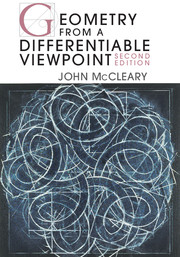Book contents
- Frontmatter
- Contents
- Preface to the second edition
- Introduction
- PART A Prelude and themes: Synthetic methods and results
- PART B Development: Differential geometry
- PART C Recapitulation and coda
- Riemann's Habilitationsvortrag: On the hypotheses which lie at the foundations of geometry
- Solutions to selected exercises
- Bibliography
- Symbol index
- Name index
- Subject index
Riemann's Habilitationsvortrag: On the hypotheses which lie at the foundations of geometry
Published online by Cambridge University Press: 05 November 2012
- Frontmatter
- Contents
- Preface to the second edition
- Introduction
- PART A Prelude and themes: Synthetic methods and results
- PART B Development: Differential geometry
- PART C Recapitulation and coda
- Riemann's Habilitationsvortrag: On the hypotheses which lie at the foundations of geometry
- Solutions to selected exercises
- Bibliography
- Symbol index
- Name index
- Subject index
Summary
Plan of the investigation
As is well known, geometry presupposes as given both the concept of space and the basic principles for constructions in space. It gives only nominal definitions of these things, while their essential specifications appear in the form of axioms. The relationship between these presuppositions is left in the dark; one does not see whether, or to what extent, any connection between them is necessary, or a priori whether any connection between them is possible.
From Euclid to Legendre, to name the most famous of the modern reformers of geometry, this darkness has been dispelled neither by the mathematicians nor by the philosophers who have concerned themselves with it. This is undoubtedly because the general concept of multiply extended quantities, which includes spatial quantities, remains completely unexplored. I have therefore first set myself the task of constructing the concept of a multiply extended quantity from general notions of quantity. It will be shown that a multiply extended quantity is susceptible of various metric relations, so that Space constitutes only a special case of a triply extended quantity. From this however it is a necessary consequence that the theorems of geometry cannot be deduced from general notions of quantity, but that those properties that distinguish Space from other conceivable triply extended quantities can only be inferred from experience.
- Type
- Chapter
- Information
- Geometry from a Differentiable Viewpoint , pp. 313 - 324Publisher: Cambridge University PressPrint publication year: 2012



